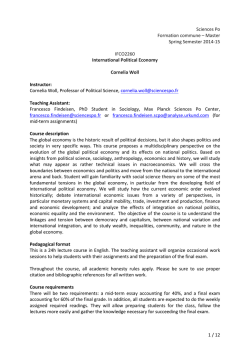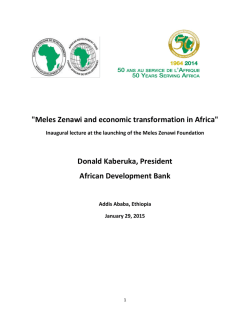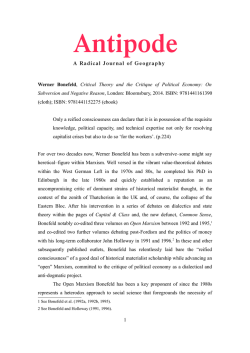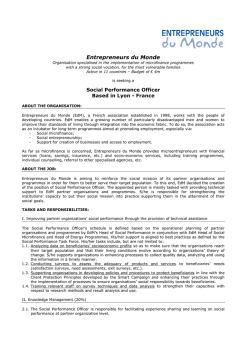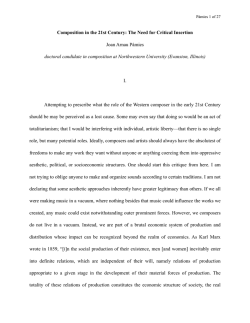
Capitalism as a Complex Evolving System
Ekonomi-tek Volume / Cilt: 3 No: 1 January / Ocak 2014, 13-22 Capitalism as a Complex Evolving System* David Colander** Abstract Economies are often classified into polar divisions—socialist, capitalist, communist. That approach is not especially useful. Successful systems are by nature pragmatic, and they evolve into blended pragmatic systems that quickly move out of any pre-specified space. Accepting that all systems are pragmatic has significant implications for economic thinking; for example, it suggests that economist’s tendency to see the economy and government as separate and not co-evolving intertwined systems mischaracterizes the policy problems facing society. The paper briefly outlines the policy implications of seeing the economy as a complex evolving system, arguing an important policy goal of government is to set up an ecostructure that helps individuals achieve their ethically acceptable desires and goals for a life well lived. Theoretical debates about market vs. government do little to further that goal. JEL codes: P1, P2, P4, L2, O2 Keywords: Complexity, economic systems, capitalism, socialism, government policy * ** Paper presented at the 4th International Conference of the Turkish Economic Association, October 18-20, 2014, Antalya, Turkey. College Professor, Middlebury College. [email protected] 14 Ekonomi-tek Volume / Cilt: 3 No:1 January / Ocak 2014 1. Introduction The future of capitalism is pragmatism. Of course, the present of capitalism is also pragmatism, as was the past of it, so by predicting pragmatism for the future of capitalism, I am not saying much. All successful systems are by nature pragmatic. They adapt and evolve as the situation changes, or they disappear. I start with this argument because, in my view, economists’ classification of systems into polar divisions—capitalism and socialism—has not been especially useful to society: it has shed little light on the current problems vexing us or on the future evolution of our economic system. In fact, the division misses the pragmatic nature of evolving systems, with the government and the market moving forward in tandem. In reality, there is no such thing as pure capitalism or unadulterated socialism in practice; these terms still live on due to economists’ desire to see the economy as not being subject to evolutionary forces. Systems are, have always been, and always will be a pragmatic mix of both philosophies, and that pragmatic mix changes over time. One problem with the capitalism/socialism dichotomy is that a society doesn’t explicitly choose what system it wants. Instead, the members of a society make billions of local choices daily that, when combined, lead to whatever system we happen to have. That’s why talking about systems as if they were somehow chosen by government or society, and as if one were better than the other, takes us nowhere. Despite the almost unending debates in our profession about the nature of capitalism, the spirit of socialism, and whether socialism is better than capitalism or vice versa, there has been no theoretical resolution, nor can there be. The most that can be said for these debates is that they keep professors in jobs and are enjoyable as works of literature. The reality is that complex systems, of which our social system is an example, are beyond full categorization and comprehension. They are constantly evolving, and to think that, from our limited time-and-space perspective, we are going to boil down the essence of any system into a glib term is the height of hubris. The terms now in use are far too coarse for that. A second problem with the capitalism/socialism dichotomy is that it presents a polar characterization of the roles of government and the market. It sets forth one economic system in which government directs the economy—socialism—and another system in opposition to that—capitalism—where the market controls the economy. This polar description sets up government and the market as alternatives, not complements. Yes, they are alternatives, but they are also complements: the market needs a government to function, and a David Colander 15 government needs a market to function. If we want to improve society, much more of policy should focus on how to get one to complement the other, thereby making the combined system better, rather than scheming how to engineer the replacement of one with the other. The existence of a good market implies a good government in the background, and vice versa. A third problem of the philosophical face-off is that it associates concern for social issues with support for government-dominated efforts to achieve social ends. It assumes that if one cares about social issues, one cannot support market solutions to social problems; one has to favor government control. Similarly, if one has no interest in social issues, one must be a free-market supporter. Neither of these needs be the case. There is no inherent connection between the degree of feeling one has for the less fortunate and one’s support or non-support of the free market. The polar juxtaposition of government and the market is deeply embedded in our profession’s “economics of control” policy narrative, which is at the heart of the textbooks: you have government, and you have the market. The invisible hand of the market coordinates individuals’ selfish actions reasonably well, and it would do so perfectly but for certain problems, such as public goods and externalities. These problems, called market failures, require government policy to correct for them. It does this by shifting the levers controlling the system to maximize social welfare, which in the current policy narrative is interpreted as identical to economic welfare. While theoretically state intervention is called for by this economics-ofcontrol model, the state’s ability to straighten out these flaws is undermined by “government failure,” where political considerations and information shortfalls prevent it from exerting optimal control. According to economists’ standard policy narrative, if there were no government failure, a market economy, after government intervention, would maximize social welfare. As I argue in my recent book, Complexity and the Art of Public Policy: Solving Society’s Problems from the Bottom Up (Colander and Kupers, 2014), this current policy narrative, while helpful for some issues, is highly limiting. Specifically, economists’ exclusive focus on it has kept them from exploring questions of endogenous norms and tastes, the ethical and moral dimensions of economic decisions, and government’s role in shaping the eco-structure within which markets operate. On these unexplored dimensions of policy depend much of the future success of nations. 16 Ekonomi-tek Volume / Cilt: 3 No:1 January / Ocak 2014 2. Economics for an Affluent Society The goal of government policy, and of economic systems, is to allow the greatest number of people to have “a life well lived”—to live as full and productive a life as possible, consistent with others also living a full and productive life. It is not to accumulate and consume as much “stuff” as possible. The reality is that the production of GDP in the affluent West has little direct correlation with a life well lived. The inhabitants of the Western world could do quite well with 5% fewer materialist goods than they currently have without feeling materially constrained. Their sense of success depends much more on the social, spiritual, and psychological dimensions of their lives—dimensions that the current economic policy narrative ignores even though the policies we economists propose affect all dimensions of life. This means that in the newly industrialized countries, such as Turkey, economic policy choices need to encompass more than the question of “How do we internalize the externalities?” They need to involve a consideration of how economic policies are influencing the parameters within which economic activities take place, the nature of property rights, and the setting of a moral foundation for government. When one starts thinking of economic policy in terms of a life well lived, rather than facilitating the getting of as much stuff as possible, one comes to a different sensibility about economic policy than the prevailing one. Western economies, such as the US and Europe, are wealthy, with enough goods available to satisfy the material needs of our populations many times over. Nonetheless, the single focus of our economic policy tends to be on increasing GDP, i.e., the growth of material wealth, not on how the market and the economy can contribute to a broader concept of social welfare, as defined by individuals themselves. That, to my mind, is a serious policy failure. What must be realized is that economic policymaking should be much more complicated than the modern narrative allows. Many economists have long recognized this. Among the more prominent is Adam Smith, who is often pictured as an economist who believed that the market could be relied on to transform people’s greedy materialist interests into the social good. That’s not an accurate portrayal of Smith’s thinking; his argument was much more subtle. Specifically, Smith’s private interests went well beyond selfish materialism; they included what might best be called private social interests—people’s private concern for others and their goals of achieving the type of society they wanted. Smith made that clear in his Theory of Moral Sentiments. This isn’t about people being told to be good—it is about tastes and goals that include a social dimension. For most, a life well David Colander 17 lived includes contributing to the social good. Doing so makes us feel good about ourselves, similar to the pleasure we feel in having the use of a car whenever we want it. So when one talks about goods, one must mention social goods—effecting some social change in the world that one would like to see—as well as private materialistic goods, like buying a McMansion. These social goods can be just as selfishly desired and pursued as private material goods. For his part, Smith approved of such private social goods being a part of an individual’s utility functions. In Smith’s view, empathy, passion, and the drive for a better world were good, whereas materialistic greed was not. In relating his ideas to policy, Smith didn’t emphasize these subtleties because when he wrote in the late 1700s, society was largely materialistically poor: many people were starving. Within that context, when Smith thought about social interests, growing a materialistic economy so that it could feed, shelter, and clothe people was his central focus. For Smith, capitalism was ideal because it led to growth in physical material output, which in turn led to a reduction in poverty and starvation. He argued that, in practice, attempts to do good by working through government entities were generally undermined by practical problems, often ending up doing more harm than good. As a result, an individual’s efforts to do good would not put him in sight of his social goals. Smith wrote The Wealth of Nations to complement his Theory of Moral Sentiments and to show how, given the right institutional structure—specifically one that encouraged entrepreneurs and maintained significant competition—social goals could, paradoxically, be reached by people pursuing their private interests. Entrepreneurs—passionate, driven people—were central to Smith’s story, as they are to any evolutionary history of policy. They contributed in two ways. First, they were the agents who translated technological change into everyday society, lowering the costs of goods and thereby passing benefits onto the consumer. Entrepreneurs were the ones who introduced disruptive advances that broke up guilds and the mercantilist system, which had been blocking the introduction of machinery that could more efficiently produce goods to bring about a rise in the population’s materialistic welfare. Then, because of competition, these men conveyed most of the advantages of such technological developments to the broader public. Second, entrepreneurs contributed to the social good by reinvesting their profits in further technology and growth. Then, in their retirement and death, these frugal non-materialists gave away much of their wealth to fulfill social goals. Indeed, that’s still happening today. Bill Gates and Warren Buffet are recent examples of this dual role that entrepreneurs play; in the 19th century, 18 Ekonomi-tek Volume / Cilt: 3 No:1 January / Ocak 2014 Andrew Carnegie argued strongly for such an entrepreneurial role in his Gospel of Wealth, and he lived it in his support for public libraries. Capitalist entrepreneurs have always been far more complicated figures than the simplistic stories of greedy businessmen would imply. Despite their support for the market, later classical economists, such as John Stuart Mill, were no cheerleaders for greed and profit maximization. They, like Smith, saw private interests as including social interests. Moreover, they fully expected that, because of the ongoing economic growth, the future economy would meet people’s economic needs. Consider John Stuart Mill’s vision (1848) of the future of capitalism. He described it as a state in which people would have transcended material needs and would be concerned with the deeper issues in life—interrelationships, social justice, ideas…. Mill pictured an ideal society that would care far more for social welfare and far less for welfare—a society in which “while no one is poor, no one desires to be richer, nor has any reason to fear being thrust back by the efforts of others to push themselves forward.” Keynes (1930) expanded on Mill’s vision. In Economic Possibilities of our Grandchildren, he wrote what, in my view, many classical liberals saw as the inevitable future of humankind. He writes: When the accumulation of wealth is no longer of high social importance, there will be great changes in the code of morals. We shall be able to rid ourselves of many of the pseudo-moral principles which have hag-ridden us for two hundred years, by which we have exalted some of the most distasteful of human qualities into the position of the highest virtues. We shall be able to afford to dare to assess the money-motive at its true value. The love of money as a possession—as distinguished from the love of money as a means to the enjoyments and realities of life—will be recognized for what it is, a somewhat disgusting morbidity, one of those semi-criminal, semi-pathological propensities which one hands over with a shudder to the specialists in mental disease. All kinds of social customs and economic practices, affecting the distribution of wealth and of economic rewards and penalties, which we now maintain at all costs, however distasteful and unjust they may be in themselves, because they are tremendously useful in promoting the accumulation of capital, we shall then be free, at last, to discard. –JM Keynes Clearly, Mill’s and Keynes’s vision of the future of capitalism was wrong. What they missed was the fact that our system is not one of unfettered capitalism, but one of pragmatism and it is not guided by a forward-looking collective rationality. It evolves in ways that reflect inertia and strong pressure for institutional survival, even when those institutions no longer fit the society’s needs. If economists are to contribute to the policy discussion in a David Colander 19 worthwhile way, we need to understand the central role of institutional structure, as Mancur Olson and Elinor Ostrom’s work does, and integrate that understanding into our policy considerations. Good policy does much more than internalize externalities; it influences the evolution of systems in positive ways, creating the framework within which individuals can have a life well lived. Therefore, one must consider policy’s effects on norms, culture, and on the eco-structure within which individuals interact. Government cannot control any of these, yet it can’t help but influence them. That is why that influence needs to be considered in policy. How to conduct that “influence policy” is a difficult question, but it is one that economists should be exploring. That’s the argument we make in complexity policy: economists’ policy considerations have to become much broader than they currently are. As I stated above, the evolution of an economic system is powered by a set of bottom-up decisions that, in the aggregate, can create a situation that does not even come close to meeting its potential. Capitalism would never have succeeded had it not evolved greatly away from how early thinkers pictured it. The problem is that the way it has evolved is preventing us from moving toward the type of society that Mill and Keynes had in mind. Here is my summary explanation of what happened. The individual capitalist entrepreneur who provided the capital and the know-how in Smith’s day soon became obsolete. Had we stayed with entrepreneurial capitalism, Western economies would never have experienced the growth that we have had. Instead, it gave way to institutional changes that allowed important divisions to spring up between ownership and control of businesses. This evolution (never envisioned by Smith) culminated in the concept of limited liability for wealth holders. This enabled the transfer of wealth without the transfer of full liability—a remarkable advance in the history of economic development. The legal and institutional structure of Western economies was transformed in order to give birth to that innovation. On the back of these changes, capitalism matured, developing from early entrepreneurial capitalism into the “adult” world of corporate managerial capitalism and corporate financial capitalism. This process was encouraged and ratified by government policy; governments set up the eco-structure to push the modified systems to flourish. They did so by establishing a commercial code within the legal structure, giving the newly developed, materialistically focused enterprises the means to survive and even thrive. The result was what has sometimes been called corporate capitalism. 20 Ekonomi-tek Volume / Cilt: 3 No:1 January / Ocak 2014 This corporate capitalism was not that theorized about by Adam Smith. It involved the state to a much larger degree than he had ever imagined and featured the transferring of some of the state’s power to private institutions (corporations), as it had in mercantilist times. This pragmatic giving away of government power to collective private enterprises was seen as economically beneficial, since it was believed it would foster continued economic growth. In their discussion of the future, classical economists did not focus on how this institutional evolution might transform the system through its influence on societal tastes and norms. They have apparently missed the fact that, just as individuals strive for survival, so, too, do organizational forms. An organizational form, once created, is bent on perpetuating its existence and figures out strategies for accomplishing that. Once for-profit corporations had met the immediate material needs of society, they learned how, through advertising, to turn material wants into material needs. Doing so provided them with additional profit-making opportunities, which were far less closely connected to social-welfare concerns than they had been earlier. The more prosperous society became, the greater the gap between the outcome of the system and a reflective view of social welfare. Whereas material needs are limited, material wants are essentially infinite, so this change gave for-profit firms an extended, almost unlimited, role in an increasingly materialistic society. As that happened, capitalism changed its very nature. Production became less important, and advertising, marketing, and branding—all mechanisms to disseminate the perception that existing forprofit companies are relevant—became central to capitalist societies; manufacturing and production became secondary. The result is our current system, where we produce and consume lots and lots of stuff, but seldom is it satisfying. 3. Complexity, Evolution, and a For-Benefit Mindset The overall goal of social policy should be to guide government to help individuals achieve their ethically acceptable desires and goals for a life well lived. That includes materialistic comfort, but not materialistic gluttony. In an affluent society, especially among its better-off members, ethically acceptable goals should be prominent among their private social goals, overshadowing their private materialistic goals. Unfortunately, existing institutions do not do a good job of helping individuals reach such private social goals. What they offer is a subliminal suggestion to seek one’s private goals in the marketplace or to salve one’s conscience vis-à-vis social goals by looking to the government to do the heavy lifting. We need a policy that encourages the founding of institutions dedicated to helping people achieve their ethically appropriate David Colander 21 private social goals from the bottom up, turning our backs on the traditional notion that social goals can only be met through top-down intervention by government. To oppose government top-down provision of social goods is not inconsistent with non-materialist, social-oriented goals. Thus, one emerges with the conviction that bottom-up institutional change is essential if we are to redirect individuals’ sights from mere materialist gain to beyond, where visions of social improvements lie. Toward that end, I am now working on a project whose mission is to stimulate the creation of forbenefit institutions as an alternative to for-profit and not-for profit institutions (Colander, 2011; Colander and Kupers, 2014). The purpose of for-benefit institutions would not only be to provide material returns for the owners but also to deliver the social goals of those same investors. Their very design is recognition that social and material goals must be married. Striving toward social goals is built into the DNA structure of the forbenefit corporation, which is socially responsible because its owners want it to be so, not because the state orders it to be so. By its nature, it makes it easier for social entrepreneurs to bring together their social and private goals, rather than compartmentalize them. The argument for for-benefit enterprises is precisely that advanced by Adam Smith on behalf of for-profit businesses: society’s goals are much more likely to be realized if they are pursued by individuals following their self-interest, which encompasses their privately held social goals. For-benefit corporations are very similar to their for-profit counterparts. Both entities represent the ideal visions of the shareholders and the management. Where they differ is that the principals within the former are not only concerned with their monetary goals; they have their eyes on their altruistic targets as well. In this way, for-benefit companies match the way humans are wired—to care simultaneously about our own quality of life and that of others. Corporations will only act in more socially responsible ways when they are told to by their shareholders or key members of senior management. 4. A Final Comment Some may see a society organized around for-benefit companies as a pipedream; I don’t. As Adam Smith long ago recognized, people are naturally a mix of social and selfish concerns. How those concerns are expressed depends on the institutional structure governing their society. By consciously focusing policymaking on positively influencing the expression of that mix, the mix can be altered. An entrepreneur can derive joy out of accomplishing a social milestone, like getting poor children vaccinated, as opposed to pur- 22 Ekonomi-tek Volume / Cilt: 3 No:1 January / Ocak 2014 chasing a second multimillion-dollar mansion or acquiring a trophy wife. It has been my experience that most of the highly successful entrepreneurs that I know say that their materialistic needs are more than satisfied. What they are looking for now is socially productive channels into which they can deploy both their considerable wealth and their energies. Indeed, venture philanthropy is thriving, and the for-benefit corporate model offers a path for philanthropists to explore in their bid to make a marked difference in the lives of others. Government should be encouraging such sentiments in this rarefied population and capitalizing on it. For-benefit companies will give social entrepreneurs the tools to affect society directly—by leveraging their abilities to concentrate on profit-making activities and society-betterment schemes at the same time, unlike the standard for-profit corporation. The result of this sea change in business culture will be nothing less than revolutionary, just as the birth of the corporation ushered in a new and richer era. If today’s social entrepreneurs invest as much passion into their altruistic activities as their forerunners of long ago applied to the pursuit of profit, we will see a massive expansion in the provision of social welfare that will rival the economic growth and the corresponding rise in material welfare that have characterized the past two centuries. References Colander, David, (2011), “Solving Society’s Problems from the Bottom Up: For-Benefit Enterprises" Challenge Magazine. Colander, David and Roland Kupers, (2014), Complexity and the Art of Public Policy: Solving Society’s Problems from the Bottom Up. Princeton: Princeton University Press. Keynes, John Maynard (1930, 1963 Print), “Economic Possibilities of our Grandchildren,” in Essays in Persuasion, Norton. New York. Mill, John Stuart, (1848), Principles of Political Economy. London: Longmans, Green. Smith, Adam, (1759), Theory of Moral Sentiments. London: A Miller. Smith, Adam, (1776), The Wealth of Nations. London: W. Strahan and T. Cadell.
© Copyright 2026



